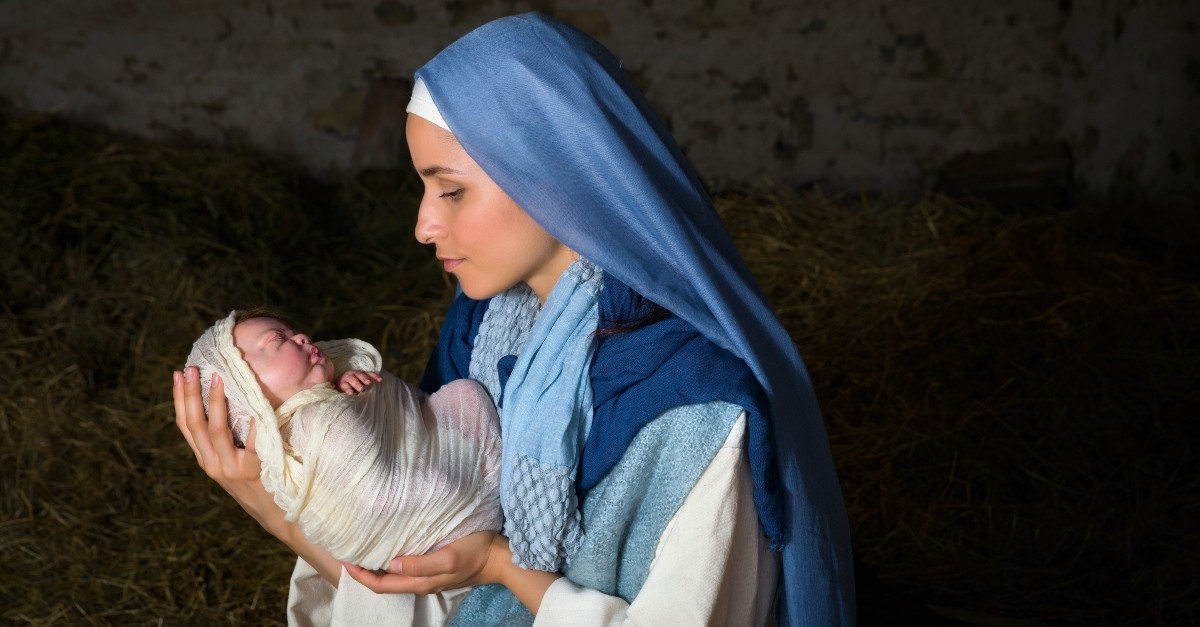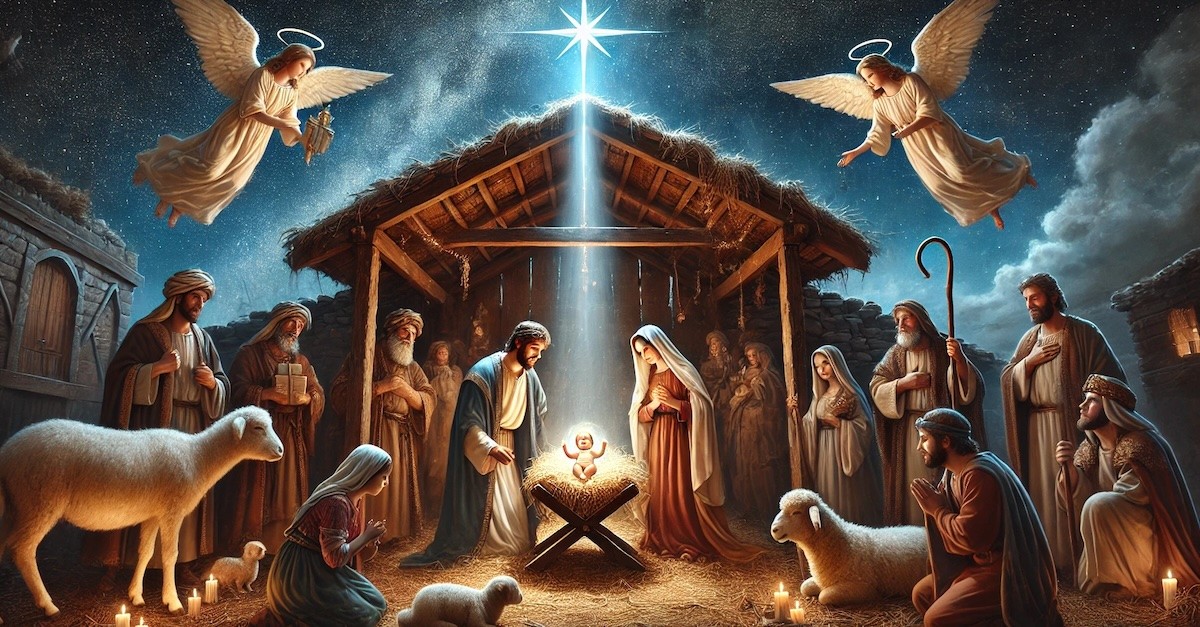
The Christmas story, the birth of Jesus, includes miraculous events that are possible only through God’s miraculous power. Penned by the physician and literary master, Luke, the Christmas story unfolds the moment when heaven touched earth and changed history forever, marking the transition from B.C. to A.D. Join me as we reflect on the brilliant star of Bethlehem that illuminated the manger where Jesus lay—a powerful act of divine orchestration that began the work of pardon and redemption. Grab your Bible, and let’s journey through this life-changing, miracle-filled passage together.
Photo Credit: ©GettyImages/Simon Lehmann

The Divine Messenger, Gabriel
The Birth of Jesus Foretold
In the sixth month of Elizabeth’s pregnancy, God sent the angel Gabriel to Nazareth, a town in Galilee, to a virgin pledged to be married to a man named Joseph, a descendant of David. The virgin’s name was Mary. The angel went to her and said, “Greetings, you who are highly favored! The Lord is with you.” - Luke 1:26-28
God’s messenger, Gabriel, appeared to Mary, a virgin betrothed to Joseph, and said, “Greetings, you who are highly favored! The Lord is with you.”
Gabriel, “one who stands in the presence of God” (Luke 1:19), came to Mary as God’s messenger of divine revelation. A few months prior, he appeared to a very old couple, Zechariah and Elizabeth, to announce the miracle birth of a son, the forerunner of Jesus. We know him as John the Baptist.
Angel encounters captivate human attention through their striking appearance, authoritative presence, and powerful messages. Some encounter angels today, which are not as significant as announcing a virgin birth yet meaningful. Consider the testimony of a missionary friend who, after nights of anxiety, experienced peace when a radiant figure appeared at her bedside. Or the mysterious man who disappeared after guiding a Midwest woman, one of our church members, who was lost in New York City. Such stories remind us that God sends His messengers when needed.
When Gabriel appeared to Mary, she was understandably confused.
Mary was greatly troubled at his words and wondered what kind of greeting this might be. But the angel said to her, “Do not be afraid, Mary; you have found favor with God. - Luke 1:29-30
The angel’s words reflected both her unique role and God’s grace. Did Mary feel perplexed by this affirmation as much as being humbled? Let’s take a closer look.
Photo Credit: © Getty Images/NikkiZalewski

Mary Was Called Highly Favored
Gabriel’s first description of Mary was the phrase “highly favored” from Luke 1: 28. Being favored, the Greek word charitoó, means favor, show, and endow with grace. As a prerequisite for receiving God’s favor, Mary’s response—her humble submission and praise in the Magnificat (Luke 1:46-55)—demonstrates her deep devotion and knowledge of the Hebrew Scriptures. Her virginity, purity, and betrothal to Joseph reflect a life lived in alignment with Jewish customs and purity laws, deepening the significance of her submission to God’s plan despite the risks of social stigma and isolation. Therefore, she was “highly” favored.
Gabriel continues.
You will conceive and give birth to a son, and you are to call him Jesus. He will be great and will be called the Son of the Most High. The Lord God will give him the throne of his father David, and he will reign over Jacob’s descendants forever; his kingdom will never end”. - Luke 1:31-33
Gabriel declared the baby’s name, His role as Savior, and described His deity as “the Son of the Most High,” with an everlasting kingdom.
“How will this be since I am a virgin?”
Photo Credit: ©Getty Images/Studio-Annika

God’s Miraculous Power Revealed
The angel answered, “The Holy Spirit will come on you, and the power of the Most High will overshadow you. So the holy one to be born will be called the Son of God. Even Elizabeth your relative is going to have a child in her old age, and she who was said to be unable to conceive is in her sixth month. For no word from God will ever fail” - Luke 1:35-37
Mary needed a bit more clarity. Look at the beauty of God’s loving care in the phrase, “…and the power of the Most High will overshadow you.”
The Greek word for overshadow (episkiazó)---to cast a shadow upon, to envelop---is used metaphorically for God’s divine presence and care. Psalm 91:1 illustrates.” He who dwells in the shelter of the Most High will abide in the shadow of the Almighty.” Or, Psalm 36:7 speaks of God’s lovingkindness to those who “take refuge in the shadow of Your wings.” God’s intimate care and protection would overshadow Mary on this journey to motherhood.
Photo Credit: ©GettyImages/Romolo Tavani

God’s Compassionate Care and Provision
Gabriel told her about her elder relative, barren Elizabeth, who was also pregnant, to reassure Mary further. Here’s the background in Luke 1:5-7.
“In the time of Herod king of Judea there was a priest named Zechariah, who belonged to the priestly division of Abijah; his wife Elizabeth was also a descendant of Aaron. Both of them were righteous in the sight of God, observing all the Lord’s commands and decrees blamelessly. But they were childless because Elizabeth was not able to conceive, and they were both very old."
Gabriel’s message of Elizabeth’s pregnancy must have brought Mary welcome relief in not being alone in such wonder. Perhaps Mary didn’t know all the miracles surrounding Elizabeth’s unexpected childbearing until she visited Elizabeth in her sixth month of pregnancy. Gabriel told Elizabeth and Zechariah of many miracles involved: 1) a son would be born, even though they were a “very old couple.” 2) The baby would be “filled with the Holy Spirit even before He was born” (1:15). 3) “He will bring back many of the people of Israel to the Lord their God” (1:16). 4) “And he will go on before the Lord, in the spirit and power of Elijah and make ready a people prepared for the Lord” (1:17) as a forerunner of Jesus, the Messiah.
Photo Credit: ©GettyImages/MKucova

Mary’s Humble Response
With Gabriel’s message of God’s love, favor, overshadowing, and comfort of her relative also being pregnant, Mary humbly responds:
“I am the Lord’s servant,” Mary answered. “May your word to me be fulfilled.” Then the angel left her. - Luke 1:38
After Gabriel departed, Mary made preparations to visit Elizabeth.
“At that time Mary got ready and hurried to see Elizabeth. As soon as Elizabeth heard Mary’s greeting, the baby leaped in her womb, and Elizabeth was filled with the Holy Spirit. In a loud voice she exclaimed: “Blessed are you among women, and blessed is the child you will bear! But why am I so favored, that the mother of my Lord should come to me? “As soon as the sound of your greeting reached my ears, the baby in my womb leaped for joy. Blessed is she who has believed that the Lord would fulfill his promises to her!” - Luke 1:39-45
Together, these two pregnant women, one barren and one a virgin, sharing their stories of Gabriel’s announcement and the miracles happening in their lives, must have made for a merry and comforting time together.
In summary, Mary, “highly favored” by God, exemplified a young woman ready to embrace the extraordinary calling of becoming the mother of Jesus. Encouraged by the miraculous experience of her once-barren relative Elizabeth, Mary’s humility, purity, and willingness demonstrated her dedication, integrity, and trust in God’s supernatural plan. She stands as a model of discipleship and faithfulness.
Photo Credit: ©iStock/Getty Images Plus/Brett Taylor

4 Things We Can Learn from the Miracles Surrounding Jesus' Birth
Considering the unbelievable yet miraculous display of God’s plan and power of giving us Jesus to redeem us from sin and live with Him in eternity, this story and the ordinary yet devoted people involved can fill our hearts with great encouragement and gratitude.
No matter what challenges we face or what God asks of us, while not facing anything as monumental as Mary, we all experience times of doubt and wonder, “How can this be?” Like Mary, we can trust the Lord, even though it seems humanly impossible. Yet, with determination and faith, believing He will lead us in His perfect plan.
Consider these four takeaways.
1. God Has an Eternal Plan
God worked through Mary—a pure, devoted, and humble young woman who praised Him for His faithfulness across generations. Her unwavering anticipation and trust remind us that God’s plans are personal and eternal.
2. God Works Miraculously in the Ordinary
Jesus’ birth involved impossible circumstances—fulfilled by God’s power. The angelic message declared His name and mission, reminding us that God’s work often blends the extraordinary with the everyday.
3. God Equips Us for the Task at Hand
Mary’s journey involved immense social risk, potential gossip, and uncomfortable circumstances. Yet she remained committed. Joseph showed righteousness by protecting her. God also sent angels to him (Matthew 1:20; 2:13,19). God empowers and equips those called to fulfill His purposes.
4. God’s Purposes Are Eternal
Through the birth of Jesus, God made a way for everyone to experience His unending love, the indwelling and overshadowing presence of the Holy Spirit, and eternal life. Mary and Joseph’s faithfulness serves as a powerful example of obedience and humility.
In the Christmas story, we can find abiding confidence in knowing that God deeply cares for us. We are miraculously created and miraculously loved. Each day, His overshadowing presence and power cover us. Just as Mary marveled, “How can this be?” we too may wonder why God calls us to tasks that seem impossible. Yet, when we, like Mary, respond with, “I am the Lord’s servant. May your word to me be fulfilled,” God equips us with everything needed to fulfill His will, often weaving miracles along the way.
Photo Credit: ©SWN/Image created using Dalle AI

Originally published Tuesday, 19 November 2024.
